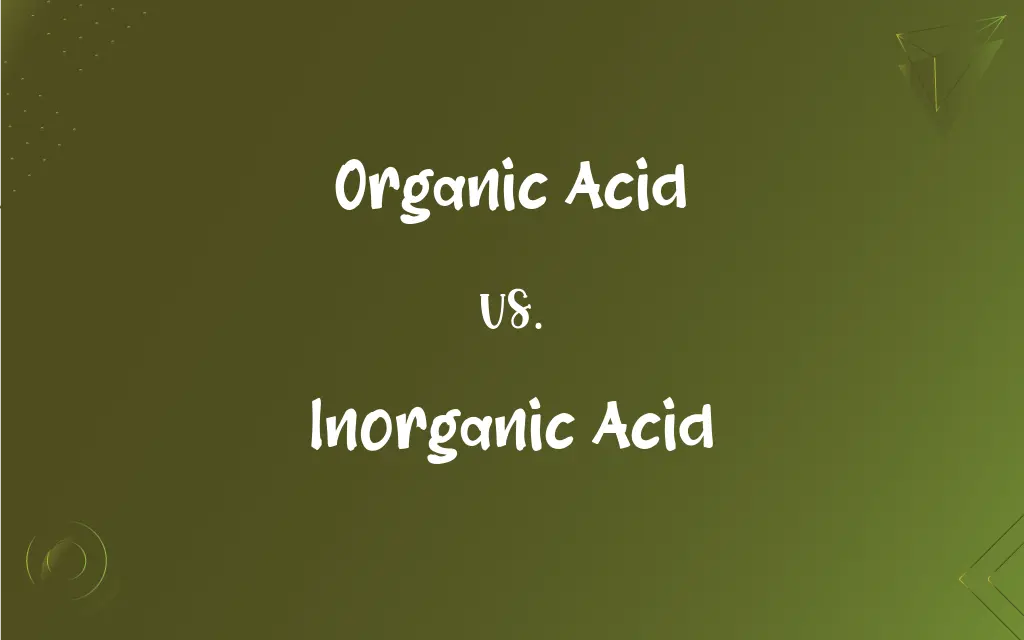Organic Acid vs. Inorganic Acid: What's the Difference?
Edited by Aimie Carlson || By Janet White || Published on January 28, 2024
Organic acids are derived from living organisms, containing carbon, while inorganic acids are mineral-based and lack carbon.

Key Differences
Organic acids naturally occur in living organisms and are characterized by the presence of carbon in their molecular structure. In contrast, inorganic acids are typically derived from mineral sources and lack carbon, focusing more on elements like sulfur, chlorine, or nitrogen.
The molecular composition of organic acids includes the carboxyl group (COOH), which is integral to their properties. Inorganic acids, however, are generally composed of hydrogen combined with nonmetals, such as sulfuric acid (H2SO4) or hydrochloric acid (HCl).
Organic acids tend to be weaker than inorganic acids, meaning they do not completely dissociate in water. Inorganic acids are often strong acids, fully dissociating in water to release hydrogen ions, contributing to their high acidity.
In terms of applications, organic acids are commonly found in food, pharmaceuticals, and natural ecosystems as part of biochemical processes. Inorganic acids are widely used in industry, such as in manufacturing, cleaning, and chemical processing.
The production of organic acids is typically through biological processes, like fermentation. In contrast, inorganic acids are usually synthesized through chemical reactions involving minerals and other inorganic compounds.
ADVERTISEMENT
Comparison Chart
Source
Living organisms
Mineral sources
Carbon Content
Contains carbon
Lacks carbon
Molecular Structure
Carboxyl group (COOH)
Hydrogen combined with nonmetals
Acid Strength
Generally weaker
Typically stronger
Applications
Food, pharmaceuticals, biochemistry
Industry, manufacturing, cleaning
ADVERTISEMENT
Organic Acid and Inorganic Acid Definitions
Organic Acid
Organic acids are weak acids derived from living organisms.
Citric acid in oranges is a common organic acid.
Inorganic Acid
Inorganic acids are commonly used in manufacturing and chemical industries.
Nitric acid is essential in fertilizer production.
Organic Acid
Organic acids are integral to metabolic processes in organisms.
Lactic acid is produced in muscles during intense exercise.
Inorganic Acid
Inorganic acids are characterized by their corrosive nature.
Phosphoric acid is used to remove rust from metals.
Organic Acid
Organic acids can be produced through fermentation processes.
Tartaric acid is a byproduct of wine fermentation.
Inorganic Acid
Inorganic acids are often strong acids that fully dissociate in water.
Sulfuric acid is used in car batteries.
Organic Acid
Organic acids contain the carboxyl group and are soluble in water.
Acetic acid gives vinegar its sour taste.
Inorganic Acid
Inorganic acids are mineral-based acids without carbon.
Hydrochloric acid is used in industrial cleaning.
Organic Acid
Organic acids are used in food preservation and flavoring.
Malic acid is added to candies for a tart flavor.
Inorganic Acid
Inorganic acids are synthesized from inorganic compounds.
Hydrofluoric acid is produced from fluorite mineral.
FAQs
Are organic acids soluble in water?
Most are water-soluble.
Are organic acids strong or weak?
They are generally weak acids.
What is an inorganic acid?
Inorganic acids are mineral-based and lack carbon.
What defines an organic acid?
Organic acids are carbon-containing acids found in living organisms.
Can organic acids be synthesized?
Yes, through fermentation and other processes.
Can inorganic acids be naturally occurring?
Yes, such as sulfuric acid in volcanic emissions.
What is the role of organic acids in metabolism?
They are key in energy production and biochemical processes.
What is a common example of an organic acid?
Citric acid in fruits.
Is hydrochloric acid organic or inorganic?
Inorganic.
Can inorganic acids be found in living organisms?
Only in very small, typically insignificant amounts.
Are inorganic acids harmful to the environment?
They can be, especially if not handled properly.
Do inorganic acids have a specific taste?
They are not typically tasted due to their corrosive nature.
Are inorganic acids typically strong?
Yes, they are often strong acids.
What is a common use of inorganic acids?
Industrial manufacturing and cleaning.
Do organic acids have a high pH?
Their pH varies but is usually lower due to acidity.
Are inorganic acids used in food?
Rarely, as they are too strong and corrosive.
How are organic acids produced commercially?
Mostly through microbial fermentation.
Is the presence of carbon the key differentiator between these acids?
Yes, carbon presence defines organic acids, while its absence characterizes inorganic acids.
Are inorganic acids corrosive?
They are generally more corrosive than organic acids.
Is vinegar an organic acid?
Yes, it contains acetic acid, an organic acid.
About Author
Written by
Janet WhiteJanet White has been an esteemed writer and blogger for Difference Wiki. Holding a Master's degree in Science and Medical Journalism from the prestigious Boston University, she has consistently demonstrated her expertise and passion for her field. When she's not immersed in her work, Janet relishes her time exercising, delving into a good book, and cherishing moments with friends and family.
Edited by
Aimie CarlsonAimie Carlson, holding a master's degree in English literature, is a fervent English language enthusiast. She lends her writing talents to Difference Wiki, a prominent website that specializes in comparisons, offering readers insightful analyses that both captivate and inform.







































































